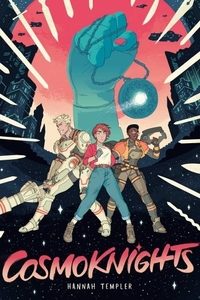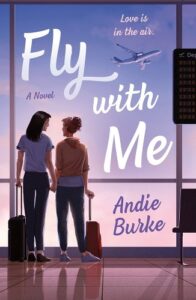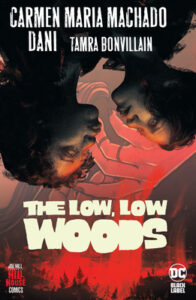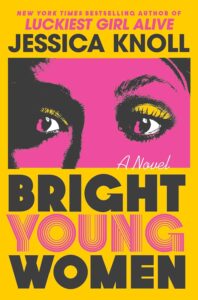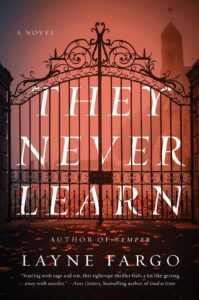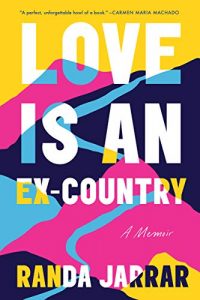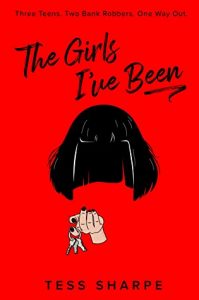Buy this from Bookshop.org to support local bookstores and the Lesbrary!
In this queer space adventure, our main character Pan has grown up alongside her best friend Tara, a princess who is soon to be married off to the winner of the interplanetary jousting game that’s about to take place in their town. Tara can’t stand the thought of accepting her fate and allowing herself to become “claimed”. So, with Pan’s help, she escapes. A few years later, two strangers appear at the door of Pan’s family home, injured and needing medical attention. When Pan discovers that these two women are undercover Cosmoknights who win tournaments and help the princesses escape the patriarchal system they’re being forced into, our main character realizes that this is her chance to get off her planet, discover what the world has to offer outside of her father’s mechanic shop, and maybe… find her best friend again.
This graphic novel is, first and foremost, absolutely stunning. The art style is really wonderful and Templer does an incredible job with colour. I took pictures of multiple panels because I was so in awe of the cosmic landscapes, the character designs, the colour schemes. Before even getting into the story itself, the book is worth opening simply for the sake of appreciating the beauty that is within its pages. It without a doubt reignited a love for graphic novels within me and reminded me just how powerful of an effect amazing art can have on a person’s state of mind and emotions.
Regarding the story itself, I really did enjoy the premise. I think it’s unique, it fits well within the sci-fi setting while still feeling contemporary and relatable. Even though it’s a quick read, each of the characters felt well-developed, including the ones that were in the story only for a short amount of time. I think the friendship (*cough* unspoken romance *cough*) between Pan and Tara was incredibly sweet. We only got a short snippet of them together at the beginning of the story and a few moments of sapphic yearning later on, and it was still enough to get me to root for them so intensely.
Of course, the queer found family aspect of this is also great. Cass and Bee as mentors or parental figures for Pan is so effective. Pan does seem to have a decent relationship with her actual parents, but you can tell that the way that she feels and acts around them is a quieter version of who she actually is. Although they aren’t bad parents per se, they do inherently force her to exist and live within a society that punishes her for trying to save her friend, that belittles her, that disrespects her, and it all clearly takes a toll on her—which is exactly why creating that parallel relationship between her and Cass and Bee was so powerful. Your parents not actively harming you isn’t necessarily enough. Having a support system that really allows you to grow and stand up for yourself is so important, especially for young people who are already struggling to understand who they are and to assert themselves within the world. Cass and Bee taking Pan under their wing and allowing her to participate in the dismantling of the Cosmiknights system while simultaneously exploring the world and maybe finding her purpose is such a beautiful representation of what found family actually means, especially to queer people.
But by far, my absolute favourite part of this book was the butch representation. Cass as a butch lesbian was phenomenal, both in character design and for her role within the story. If you know me then you know I adore a beefy butch lesbian. The fact that she is genuinely muscular and not simply toned is so wonderful. She’s tall and broad-shouldered, she dresses in a very masculine way, she’s strong and puts up a real fight for the other Cosmoknights—which is incredibly satisfying to witness. She has that smirk and that charm and that slight cockiness that makes me weak in the knees, and there is not a single thing about her that exists to placate her masculinity. Of course, people can exist within whatever bounds of femininity and masculinity they want to, and gender expression is something so personal to every single individual. But there is a habit, in media and art as a whole, to “feminize” butch lesbians so as to not make them “too masculine”. It is so refreshing to come across a character that embraces her masculinity, that loves the way that she is, that proudly rejects the femininity that was forced upon her—not because she looks down upon feminine traits, but simply because it is not who she is, and she will not let anyone take her masculinity away from her.
The other great thing about Cass is that Templer uses her character to perfectly exemplify butchness as being a protector. It is more than just dressing a certain way or keeping your hair short: butches hold an actual role in butch/femme communities and history, and I think it is so beautifully showcased in this story. I loved her not just as a character but as a representation of all the butches I’ve known and loved.
Her relationship with Bee is also fantastic. Bee is sort of the brains behind their operation; she’s incredibly cunning and does a lot of the planning and strategizing. She’s very tech savvy and she supports Cass in the battlefield a ton. Their relationship is so heartwarming and works so well as a whole. They balance each other out perfectly and every panel where you see them simply holding hands made my heart instantly melt.
I am so excited to pick up the second volume for this and I cannot wait to see how their story continues. If you’re a fan of graphic novels or sci-fi stories, or taking down the patriarchy, or pretty colours, or lesbians, then I wholeheartedly recommend this to you.
Representation: sapphic MC, lesbian couple, butch lesbian, Black lesbian
Content warnings: blood, violence, injury, misogyny, sexism

